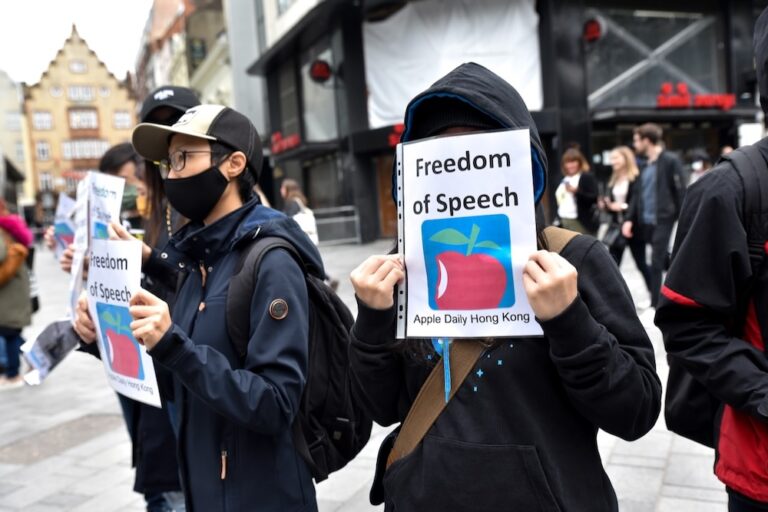(IAPA/IFEX) – The following is a 3 November 2004 IAPA press release: IAPA highlights Inter-American Court rulings and supports Commission and Special Rapporteur Miami (November 3, 2004).- The Inter American Press Association (IAPA) highlighted during its annual meeting recent rulings made by the Inter-American Court on Human Rights, stating that they comprise important legal precedents […]
(IAPA/IFEX) – The following is a 3 November 2004 IAPA press release:
IAPA highlights Inter-American Court rulings and supports Commission and Special Rapporteur
Miami (November 3, 2004).- The Inter American Press Association (IAPA) highlighted during its annual meeting recent rulings made by the Inter-American Court on Human Rights, stating that they comprise important legal precedents in the defense of freedom of expression and of the press in the Americas.
Also, regarding human rights, the IAPA issued a resolution supporting the Executive Secretary of the Inter-American Commission on Human Rights and the Special Rapporteur on Freedom of Expression, offices that had been affected by the restructuring announced by former Secretary General of the Organization of American States, Miguel Angel Rodríguez.
Both resolutions below were approved during the IAPA General Assembly held in Antigua, Guatemala, on October 22-26, which was attended by more than 500 editors, publishers, and journalists from throughout the hemisphere.
Inter-American Jurisprudence
WHEREAS
in the second half of 2004, the Inter-American Court of Human Rights handed down rulings in the cases of Costa Rican journalist Mauricio Herrera and Paraguayan politician Ricardo Canese
WHEREAS
the legal precedents set in both rulings constitute a milestone in the protection of freedom of speech and of the press on the American continent
WHEREAS
in the Herrera case, the Court reiterated the importance of an independent press for a democracy and emphasized that persons who are influential in matters of public interest should expect to endure a greater degree of scrutiny and criticism
WHEREAS
in the same case, the Court limited the Draconian burden of proof required in the majority of our countries and held that those who faithfully reproduce statements and information taken from third parties cannot be held liable
WHEREAS
in a concurring opinion, the president of the Court opposes criminalizing the inevitable wrongs deriving from the exercise of freedom of speech
WHEREAS
in the ruling in the Canese case, the Court questioned the appropriateness of the prosecution of the Paraguayan politician
WHEREAS
in the same case, the Court established parameters for broadening democratic debate beyond the limits set by inadequate laws extant in much of the Continent
WHEREAS
Principle 1 of the Declaration of Chapultepec states: “No people or society can be free without freedom of expression and of the press. The exercise of this freedom is not something authorities grant, it is an inalienable right of the people”
THE GENERAL ASSEMBLY OF THE IAPA RESOLVES
to disseminate throughout the Continent the new legal precedents set by the Inter-American Court of Human Rights so they might serve as a tool for journalists and for the attorneys who act in their defense
to contact all the governments of the Continent so they might incorporate into their legal canons the principles clearly outlined in the rulings of the Inter-American Court of Human Rights
to emphasize to all governments the advisability of decriminalizing the wrongs that sometimes accompany the exercise of freedom of speech.
Human Rights
WHEREAS
the Inter-American Commission on Human Rights of the Organization of American States (OAS), its Secretariat and the Office of the Special Rapporteur for Freedom of Expression, acting with the autonomy and independence vested in them, are powerful tools in defense of the rights and freedoms of all citizens of the Americas
WHEREAS
the Office of the Special Rapporteur for Freedom of Expression was established on the recommendation of the IAPA and other organizations to advocate for freedom of the press and human rights following the Hemispheric Summit on Unpunished Crimes Against Journalists held in Guatemala in 1997
WHEREAS
since its founding, first under the leadership of Dr. Santiago Cantón and now under Dr. Eduardo Bertoni, the Office of the Special Rapporteur has acted above reproach and with due vigor in fulfillment of its mission to monitor and defend freedom of the press
WHEREAS
with the change of office at the General Secretariat of the OAS, measures were proposed that were intended to eliminate or diminish the stature, autonomy and independence of the Secretariat and the Office of the Special Rapporteur of the IACHR, which could have compromised the inter-American system of justice
WHEREAS
these initiatives failed due to the sudden resignation of the Secretary General of the OAS
THE GENERAL ASSEMBLY OF THE IAPA RESOLVES
to reaffirm its unwavering support for the Secretariat and Office of the Special Rapporteur of the IACHR of the OAS, whose work must be distinguished by autonomy and independence, and protected from all forms of interference or pressure, whether political or governmental
to express the resolve of this Association to unceasingly preserve and uphold the permanence, independence and work of the Secretariat and Office of the Special Rapporteur of the IACHR.


